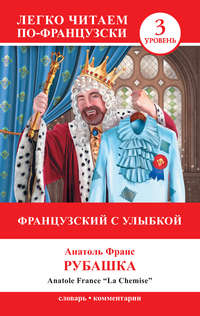 полная версия
полная версияThe Revolt of the Angels
He mounted in haste to the abode of the philosophers and the globes, and there with his own eyes confirmed the magnitude of the disaster.
There were yawning gaps on many a shelf. He searched here and there, opened cupboards, dragged out brooms, dusters, and fire-extinguishers, rattled the shovel in the coke fire, shook out Monsieur Sariette's best frock-coat that was hanging in the cloak-room, and then stood and gazed disconsolately at the empty places left by the Gassendi portfolios.
For the past half-century the whole learned world had been loudly clamouring for the publication of this correspondence. Monsieur René d'Esparvieu had not responded to the universal desire, unwilling either to assume so heavy a task, or to resign it to others. Having found much boldness of thought in these letters, and many passages of more libertine tendency than the piety of the twentieth century could endure, he preferred that they should remain unpublished; but he felt himself responsible for their safe-keeping, not only to his country but to the whole civilized world.
"How can you have allowed yourself to be robbed of such a treasure?" he asked severely of Monsieur Sariette.
"How can I have allowed myself to be robbed of such a treasure?" repeated the unhappy librarian. "Monsieur, if you opened my breast, you would find that question engraved upon my heart."
Unmoved by this powerful utterance, Monsieur d'Esparvieu continued with pent-up fury:
"And you have discovered no single sign that would put you on the track of the thief, Monsieur Sariette? You have no suspicion, not the faintest idea, of the way these things have come to pass? You have seen nothing, heard nothing, noticed nothing, learnt nothing? You must grant this is unbelievable. Think, Monsieur Sariette, think of the possible consequences of this unheard-of theft, committed under your eyes. A document of inestimable value in the history of the human mind disappears. Who has stolen it? Why has it been stolen? Who will gain by it? Those who have got possession of it doubtless know that they will be unable to dispose of it in France. They will go and sell it in America or Germany. Germany is greedy for such literary monuments. Should the correspondence of Gassendi with Gabriel Naudé go over to Berlin, if it is published there by German savants, what a disaster, nay, what a scandal! Monsieur Sariette, have you not thought of that?.."
Beneath the stroke of an accusation all the more cruel in that he brought it against himself, Monsieur Sariette stood stupefied, and was silent. And Monsieur d'Esparvieu continued to overwhelm him with bitter reproaches.
"And you make no effort. You devise nothing to find these inestimable treasures. Make enquiries, bestir yourself, Monsieur Sariette; use your wits. It is well worth while."
And Monsieur d'Esparvieu went out, throwing an icy glance at his librarian.
Monsieur Sariette sought the lost books and manuscripts in every spot where he had already sought them a hundred times, and where they could not possibly be. He even looked in the coke-box and under the leather seat of his arm-chair. When midday struck he mechanically went downstairs. At the foot of the stairs he met his old pupil Maurice, with whom he exchanged a bow. But he only saw men and things as through a mist.
The broken-hearted curator had already reached the hall when Maurice called him back.
"Monsieur Sariette, while I think of it, do have the books removed that are choking up my garden-house."
"What books, Maurice?"
"I could not tell you, Monsieur Sariette, but there are some in Hebrew, all worm-eaten, with a whole heap of old papers. They are in my way. You can't turn round in the passage."
"Who took them there?"
"I'm bothered if I know."
And the young man rushed off to the dining-room, the luncheon gong having sounded quite a minute ago.
Monsieur Sariette tore away to the summer-house. Maurice had spoken the truth. About a hundred volumes were there, on tables, on chairs, even on the floor. When he saw them he was divided betwixt joy and fear, filled with amazement and anxiety. Happy in the finding of his lost treasure, dreading to lose it again, and completely overwhelmed with astonishment, the man of books alternately babbled like an infant and uttered the hoarse cries of a maniac. He recognised his Hebrew Bibles, his ancient Talmuds, his very old manuscript of Flavius Josephus, his portfolios of Gassendi's letters to Gabriel Naudé, and his richest jewel of all, to wit, Lucretius adorned with the arms of the Grand Prior of France, and with notes in Voltaire's own hand. He laughed, he cried, he kissed the morocco, the calf, the parchment, and vellum, even the wooden boards studded with nails.
As fast as Hippolyte, the manservant, returned with an armful to the library, Monsieur Sariette, with a trembling hand, restored them piously to their places.
CHAPTER VII
OF A SOMEWHAT LIVELY INTEREST, WHEREOF THE MORAL WILL, I HOPE, APPEAL GREATLY TO MY READERS, SINCE IT CAN BE EXPRESSED BY THIS SORROWFUL QUERY: "THOUGHT, WHITHER DOST THOU LEAD ME?" FOR IT IS A UNIVERSALLY ADMITTED TRUTH THAT IT IS UNHEALTHY TO THINK AND THAT TRUE WISDOM LIES IN NOT THINKING AT ALL
ALL the books were now once more assembled in the pious keeping of Monsieur Sariette. But this happy reunion was not destined to last. The following night twenty volumes left their places, among them the Lucretius of Prior de Vendôme. Within a week the old Hebrew and Greek texts had all returned to the summer-house, and every night during the ensuing month they left their shelves and secretly went on the same path. Others betook themselves no one knew whither.
On hearing of these mysterious occurrences, Monsieur René d'Esparvieu merely remarked with frigidity to his librarian:
"My poor Sariette, all this is very queer, very queer indeed."
And when Monsieur Sariette tentatively advised him to lodge a formal complaint or to inform the Commissaire de Police, Monsieur d'Esparvieu cried out upon him:
"What are you suggesting, Monsieur Sariette? Divulge domestic secrets, make a scandal! You cannot mean it. I have enemies, and I am proud of it. I think I have deserved them. What I might complain about is that I am wounded in the house of my friend, attacked with unheard-of violence, by fervent loyalists, who, I grant you, are good Catholics, but exceedingly bad Christians… In a word, I am watched, spied upon, shadowed, and you suggest, Monsieur Sariette, that I should make a present of this comic-opera mystery, this burlesque adventure, this story in which we both cut somewhat pitiable figures, to a set of spiteful journalists? Do you wish to cover me with ridicule?"
The result of the colloquy was that the two gentlemen agreed to change all the locks in the library. Estimates were asked for and workmen called in. For six weeks the d'Esparvieu household rang from morning till night with the sound of hammers, the hum of centre-bits, and the grating of files. Fires were always going in the abode of the philosophers and globes, and the people of the house were simply sickened by the smell of heated oil. The old, smooth, easy-running locks were replaced, on the cupboards and doors of the rooms, by stubborn and tricky fastenings. There was nothing but combinations of locks, letter-padlocks, safety-bolts, bars, chains, and electric alarm-bells.
All this display of ironmongery inspired fear. The lock-cases glistened, and there was much grinding of bolts. To gain access to a room, a cupboard, or a drawer, it was necessary to know a certain number, of which Monsieur Sariette alone was cognisant. His head was filled with bizarre words and tremendous numbers, and he got entangled among all these cryptic signs, these square, cubic, and triangular figures. He himself couldn't get the doors and the cupboards undone, yet every morning he found them wide open, and the books thrown about, ransacked, and hidden away. In the gutter of the Rue Servandoni a policeman picked up a volume of Salomon Reinach on the identity of Barabbas and Jesus Christ. As it bore the book-plate of the d'Esparvieu library he returned it to the owner.
Monsieur René d'Esparvieu, not even deigning to inform Monsieur Sariette of the fact, made up his mind to consult a magistrate, a friend in whom he had complete confidence, to wit, a certain Monsieur des Aubels, Counsel at the Law Courts, who had put through many an important affair. He was a little plump man, very red, very bald, with a cranium that shone like a billiard ball. He entered the library one morning feigning to come as a book-lover, but he soon showed that he knew nothing about books. While all the busts of the ancient philosophers were reflected in his shining pate, he put divers insidious questions to Monsieur Sariette, who grew uncomfortable and turned red, for innocence is easily flustered. From that moment Monsieur des Aubels had a mighty suspicion that Monsieur Sariette was the perpetrator of the very thefts he denounced with horror; and it immediately occurred to him to seek out the accomplices of the crime. As regards motives, he did not trouble about them; motives are always to be found. Monsieur des Aubels told Monsieur René d'Esparvieu that, if he liked, he would have the house secretly watched by a detective from the Prefecture.
"I will see that you get Mignon," he said. "He is an excellent servant, assiduous and prudent."
By six o'clock next morning Mignon was already walking up and down outside the d'Esparvieus' house, his head sunk between his shoulders, wearing love-locks which showed from under the narrow brim of his bowler hat, his eye cocked over his shoulder. He wore an enormous dull-black moustache, his hands and feet were huge; in fact, his whole appearance was distinctly memorable. He paced regularly up and down from the nearest of the big rams' head pillars which adorn the Hôtel de la Sordière to the end of the Rue Garancière, towards the apse of St. Sulpice Church and the dome of the Chapel of the Virgin.
Henceforth it became impossible to enter or leave the d'Esparvieus' house without feeling that one's every action, that one's very thoughts, were being spied upon. Mignon was a prodigious person endowed with powers that Nature denies to other mortals. He neither ate nor slept. At all hours of the day and night, in wind and rain, he was to be found outside the house, and no one escaped the X-rays of his eye. One felt pierced through and through, penetrated to the very marrow, worse than naked, bare as a skeleton. It was the affair of a moment; the detective did not even stop, but continued his everlasting walk. It became intolerable. Young Maurice threatened to leave the paternal roof if he was to be so radiographed. His mother and his sister Berthe complained of his piercing look; it offended the chaste modesty of their souls. Mademoiselle Caporal, young Léon d'Esparvieu's governess, felt an indescribable embarrassment. Monsieur René d'Esparvieu was sick of the whole business. He never crossed his own threshold without crushing his hat over his eyes to avoid the investigating ray and without wishing old Sariette, the fons et origo of all the evil, at the devil. The intimates of the household, such as Abbé Patouille and Uncle Gaétan, made themselves scarce; visitors gave up calling, tradespeople hesitated about leaving their goods, the carts belonging to the big shops scarcely dared stop. But it was among the domestics that the spying roused the most disorder.
The footman, afraid, under the eye of the police, to go and join the cobbler's wife over her solitary labours in the afternoon, found the house unbearable and gave notice. Odile, Madame d'Esparvieu's lady's-maid, not daring, as was her custom after her mistress had retired, to introduce Octave, the handsomest of the neighbouring bookseller's clerks, to her little room upstairs, grew melancholy, irritable and nervous, pulled her mistress's hair while dressing it, spoke insolently, and made advances to Monsieur Maurice. The cook, Madame Malgoire, a serious matron of some fifty years, having no more visits from Auguste, the wine-merchant's man in the Rue Servandoni, and being incapable of suffering a privation so contrary to her temperament, went mad, sent up a raw rabbit to table, and announced that the Pope had asked her hand in marriage. At last, after a fortnight of superhuman assiduity, contrary to all known laws of organic life, and to the essential conditions of animal economy, Mignon, the detective, having observed nothing abnormal, ceased his surveillance and withdrew without a word, refusing to accept a gratuity. In the library the dance of the books became livelier than ever.
"That is all right," said Monsieur des Aubels. "Since nothing comes in nor goes out, the evil-doer must be in the house."
The magistrate thought it possible to discover the criminal without police-warrant or enquiry. On a date agreed upon at midnight, he had the floor of the library, the treads of the stairs, the vestibule, the garden path leading to Monsieur Maurice's summer-house, and the entrance hall of the latter, all covered with a coating of talc.
The following morning Monsieur des Aubels, assisted by a photographer from the Prefecture, and accompanied by Monsieur René d'Esparvieu and Monsieur Sariette, came to take the imprints. They found nothing in the garden, the wind had blown away the coating of talc; nothing in the summer-house either. Young Maurice told them he thought it was some practical joke and that he had brushed away the white dust with the hearth-brush. The real truth was, he had effaced the traces left by the boots of Odile, the lady's-maid. On the stairs and in the library the very light print of a bare foot could be discerned, it seemed to have sprung into the air and to have touched the ground at rare intervals and without any pressure. They discovered five of these traces. The clearest was to be found in the abode of the busts and spheres, on the edge of the table where the books were piled. The photographer took several negatives of this imprint.
"This is more terrifying than anything else," murmured Monsieur Sariette.
Monsieur des Aubels did not hide his surprise.
Three days later the anthropometrical department of the Prefecture returned the proofs exhibited to them, saying that they were not in the records.
After dinner Monsieur René showed the photographs to his brother Gaétan, who examined them with profound attention, and after a long silence exclaimed:
"No wonder they have not got this at the Prefecture; it is the foot of a god or of an athlete of antiquity. The sole that made this impression is of a perfection unknown to our races and our climates. It exhibits toes of exquisite grace, and a divine heel."
René d'Esparvieu cried out upon his brother for a madman.
"He is a poet," sighed Madame d'Esparvieu.
"Uncle," said Maurice, "you'll fall in love with this foot if you ever come across it."
"Such was the fate of Vivant Denon, who accompanied Bonaparte to Egypt," replied Gaétan. "At Thebes, in a tomb violated by the Arabs, Denon found the little foot of a mummy of marvellous beauty. He contemplated it with extraordinary fervour, 'It is the foot of a young woman,' he pondered, 'of a princess – of a charming creature. No covering has ever marred its perfect shape.' Denon admired, adored, and loved it. You may see a drawing of this little foot in Denon's atlas of his journey to Egypt, whose leaves one could turn over upstairs, without going further afield, if only Monsieur Sariette would ever let us see a single volume of his library."
Sometimes, in bed, Maurice, waking in the middle of the night, thought he heard the sound of pages being turned over in the next room, and the thud of bound volumes falling on the floor.
One morning at five o'clock he was coming home from the club, after a night of bad luck, and while he stood outside the door of the summer-house, hunting in his pocket for his keys, his ears distinctly heard a voice sighing:
"Knowledge, whither dost thou lead me? Thought, whither dost thou lure me?"
But entering the two rooms he saw nothing, and told himself that his ears must have deceived him.
CHAPTER VIII
WHICH SPEAKS OF LOVE, A SUBJECT WHICH ALWAYS GIVES PLEASURE, FOR A TALE WITHOUT LOVE IS LIKE BEEF WITHOUT MUSTARD: AN INSIPID DISH
NOTHING ever astonished Maurice. He never sought to know the causes of things and dwelt tranquilly in the world of appearances. Not denying the eternal truth, he nevertheless followed vain things as his fancy led him.
Less addicted to sport and violent exercise than most young people of his generation, he followed unconsciously the old erotic traditions of his race. The French were ever the most gallant of men, and it were a pity they should lose this advantage. Maurice preserved it. He was in love with no woman, but, as St. Augustine said, he loved to love. After paying the tribute that was rightly due to the imperishable beauty and secret arts of Madame de la Berthelière, he had enjoyed the impetuous caresses of a young singer called Luciole. At present he was joylessly experiencing the primitive perversity of Odile, his mother's lady's-maid, and the tearful adoration of the beautiful Madame Boittier. And he felt a great void in his heart.
It chanced that one Wednesday, on entering the drawing-room where his mother entertained her friends – who were, generally speaking, unattractive and austere ladies, with a sprinkling of old men and very young people – he noticed, in this intimate circle, Madame des Aubels, the wife of the magistrate at the Law Courts, whom Monsieur d'Esparvieu had vainly consulted on the mysterious ransacking of his library. She was young, he found her pretty, and not without cause. Gilberte had been modelled by the Genius of the Race, and no other genius had had a part in the work.
Thus all her attributes inspired desire, and nothing in her shape or her being aroused any other sentiment.
The law of attraction which draws world to world moved young Maurice to approach this delicious creature, and under its influence he offered to escort her to the tea-table. And when Gilberte was served with tea, he said:
"We should hit it off quite well together, you and I, don't you think?"
He spoke in this way, according to modern usage, so as to avoid inane compliments and to spare a woman the boredom of listening to one of those old declarations of love which, containing nothing but what is vague and undefined, require neither a truthful nor an exact reply.
And profiting by the fact that he had an opportunity of conversing secretly with Madame des Aubels for a few minutes, he spoke urgently and to the point. Gilberte, so far as one could judge, was made rather to awaken desire than to feel it. Nevertheless, she well knew that her fate was to love, and she followed it willingly and with pleasure. Maurice did not particularly displease her. She would have preferred him to be an orphan, for experience had taught her how disappointing it sometimes is to love the son of the house.
"Will you?" he said by way of conclusion.
She pretended not to understand, and with her little foie-gras sandwich raised half-way to her mouth she looked at Maurice with wondering eyes.
"Will I what?" she asked.
"You know quite well."
Madame des Aubels lowered her eyes, and sipped her tea, for her prudishness was not quite vanquished. Meanwhile Maurice, taking her empty cup from her hand, murmured:
"Saturday, five o'clock, 126 Rue de Rome, on the ground-floor, the door on the right, under the arch. Knock three times."
Madame des Aubels glanced severely and imperturbably at the son of the house, and with a self-possessed air rejoined the circle of highly respectable women to whom the Senator Monsieur Le Fol was explaining how artificial incubators were employed at the agricultural colony at St. Julienne.
The following Saturday, Maurice, in his ground-floor flat, awaited Madame des Aubels. He waited her in vain. No light hand came to knock three times on the door under the arch. And Maurice gave way to imprecation, inwardly calling the absent one a jade and a hussy. His fruitless wait, his frustrated desires, rendered him unjust. For Madame des Aubels in not coming where she had never promised to go hardly deserved these names; but we judge human actions by the pleasure or pain they cause us.
Maurice did not put in an appearance in his mother's drawing-room until a fortnight after the conversation at the tea-table. He came late. Madame des Aubels had been there for half an hour. He bowed coldly to her, took a seat some way off, and affected to be listening to the talk.
"Worthily matched," a rich male voice was saying; "the two antagonists were well calculated to render the struggle a terrible and uncertain one. General Bol, with unprecedented tenacity, maintained his position as though he were rooted in the very soil. General Milpertuis, with an agility truly superhuman, kept carrying out movements of the most dazzling rapidity around his immovable adversary. The battle continued to be waged with terrible stubbornness. We were all in an agony of suspense…"
It was General d'Esparvieu describing the autumn manœuvres to a company of breathlessly interested ladies. He was talking well and his audience were delighted. Proceeding to draw a comparison between the French and German methods, he defined their distinguishing characteristics and brought out the conspicuous merits of both with a lofty impartiality. He did not hesitate to affirm that each system had its advantages, and at first made it appear to his circle of wondering, disappointed, and anxious dames, whose countenances were growing increasingly gloomy, that France and Germany were practically in a position of equality. But little by little, as the strategist went on to give a clearer definition of the two methods, that of the French began to appear flexible, elegant, vigorous, full of grace, cleverness, and verve; that of the Germans heavy, clumsy, and undecided. And slowly and surely the faces of the ladies began to clear and to light up with joyous smiles. In order to dissipate any lingering shadows of misgiving from the minds of these wives, sisters, and sweethearts, the General gave them to understand that we were in a position to make use of the German method when it suited us, but that the Germans could not avail themselves of the French method. No sooner had he delivered himself of these sentiments than he was button-holed by Monsieur le Truc de Ruffec, who was engaged in founding a patriotic society known as "Swordsmen All," of which the object was to regenerate France and ensure her superiority over all her adversaries. Even children in the cradle were to be enrolled, and Monsieur le Truc de Ruffec offered the honorary presidency to General d'Esparvieu.
Meanwhile Maurice was appearing to be interested in a conversation that was taking place between a very gentle old lady and the Abbé Lapetite, Chaplain to the Dames du Saint Sang. The old lady, severely tried of late by illness and the loss of friends, wanted to know how it was that people were unhappy in this world.
"How," she asked Abbé Lapetite, "do you explain the scourges that afflict mankind? Why are there plagues, famines, floods, and earthquakes?"
"It is surely necessary that God should sometimes remind us of his existence," replied Abbé Lapetite, with a heavenly smile.
Maurice appeared keenly interested in this conversation. Then he seemed fascinated by Madame Fillot-Grandin, quite a personable young woman, whose simple innocence, however, detracted all piquancy from her beauty, all savour from her bodily charms. A very sour, shrill-voiced old lady, who, affecting the dowdy, woollen weeds of poverty, displayed the pride of a great lady in the world of Christian finance, exclaimed in a squeaky voice:
"Well, my dear Madame d'Esparvieu, so you have had trouble here. The papers speak darkly of robbery, of thefts committed in Monsieur d'Esparvieu's valuable library, of stolen letters…"
"Oh," said Madame d'Esparvieu, "if we are to believe all the newspapers say…"
"Oh, so, dear Madame, you have got your treasures back. All's well that ends well."
"The library is in perfect order," asserted Madame d'Esparvieu. "There is nothing missing."
"The library is on the floor above this, is it not?" asked young Madame des Aubels, showing an unexpected interest in the books.









